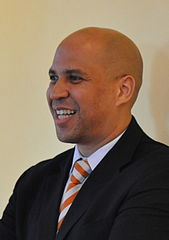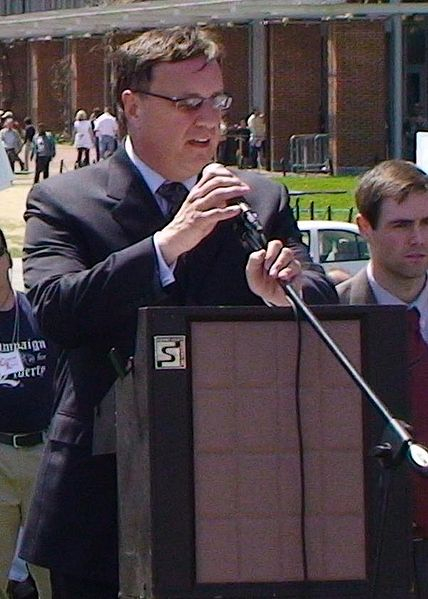Rutgers-Eagleton Poll: Booker Holds Larger than Expected Lead Over Lonegan on Eve of Special Senate Election

NEW BRUNSWICK, N.J – With just two days to go until the Oct. 16 special U.S. Senate election, Newark Mayor Cory Booker holds a 58 percent to 36 percent lead over former Republican Bogota Mayor Steve Lonegan among likely voters, a new Rutgers-Eagleton Poll finds. Another 3 percent prefer someone else, and about 3 percent remain undecided. While the Democrat’s lead is less than he enjoyed following the August primary, compared to other polls this latest Rutgers-Eagleton poll suggests Booker has recently gained in his bid to succeed the late Frank Lautenberg.
The debates between Booker and Lonegan, which highlighted the stark policy differences between them, may have played an important role in Booker’s current performance. While 43 percent of all likely voters paid some attention to a debate, independent voters who followed the debates strongly favor Booker, 59 percent to 37 percent. But independents ignoring the debates prefer Lonegan by a 45 percent to 42 percent margin.
For partisans, attention to the debates reinforced support for their own party’s candidate. At this point, Booker does much better than Lonegan within his party: 96 percent of likely Democrats are in Booker’s corner, while Lonegan wins only 74 percent of Republicans. GOP backers are less likely to have followed the debates: 36 percent compared to 49 percent of Democrats and 43 percent of likely independent voters.
“Other recent polls showed a narrower lead for Booker, but voters we talked to seem to have moved back in his direction,” said David Redlawsk, director of the Rutgers-Eagleton Poll and professor of political science at Rutgers. “The debates presented a stark picture of the differences between the candidates, which appears to have led independents to prefer Booker. While both candidates came out swinging, Lonegan’s attacks bordered on the taboo, with his ‘floating dead bodies’ and ‘big black hole’ comments about Newark – reminiscent of the rhetoric that got him into hot water early in the campaign. Independents in particular dislike these kinds of attack.”
Results are from a sample of 513 likely voters with a margin of error of +/- 4.3 percentage points. These likely voters are part of a sample of 798 registered voters polled statewide using live callers to both landline and cell phone households from Oct. 7-13.
Voters paying some attention
The uniqueness of the special Senate election makes estimates of turnout difficult and suggests that the final result will be unusually dependent on the candidates’ abilities to motivate their supporters. There is some evidence that voters are paying attention. More than half of registered voters know there is an election in October, and 45 percent know it will be held Oct. 16. Just over half are following the election at least fairly closely, with about one in five paying very close attention. Sixty percent of registered voters claim they are very likely to vote Wednesday.
Booker holds a commanding lead with minority voters, urbanites and voters in the South Jersey/Philadelphia region. Lonegan leads among voters in shore counties, 46 percent to 44 percent, while losing northwestern exurban voters, 51 percent to 41 percent, a better performance than his statewide margin.
“Here’s the key: if the Booker campaign can turn out urban voters and Democrats who say they will vote, he will be in the range we estimate,” said Redlawsk. “If Lonegan’s turnout operation is stronger and Booker’s base stays home thinking it is all wrapped up, then all bets are off.”
Booker ratings down slightly on Lonegan attacks

Lonegan’s attacks throughout the campaign appear to have had some impact. While Booker receives positive ratings from 54 percent of likely voters, this is a nine-point drop from an early September Rutgers-Eagleton Poll. Concurrently, his unfavorability has almost doubled to 32 percent. Still, asked to rate the Democrat on a scale of 0 to 100 degrees, voters remain warm toward Booker with an average score of 56 degrees. The overriding emotional response to Booker is “hope,” with 48 percent saying his campaign makes them feel hopeful and 33 percent proud. In contrast, only 12 percent are angered and 19 percent worried by Booker.
Lonegan, however, continues to leave either a negative impression or none at all on most likely voters. While favorable impressions of the Republican have risen eight points to 30 percent, the share of voters who hold unfavorable impressions climbed to 34 percent. Over one third have no opinion on the GOP candidate. In general, likely voters are quite cool toward Lonegan; he averages only 41 degrees on the poll’s thermometer. Voters feel more negative about Lonegan than Booker: 37 percent are worried, and 30 percent angered by his campaign. Thirty percent are hopeful and 16 percent are proud of the candidate.
Many voters see Booker as a self-promoter
Booker is not without weaknesses. A third of likely voters say Booker is more about self-promotion and that life in Newark has improved little under this watch. While Lonegan has gained some support though this line of attack, a plurality (47 percent) continues to believe Booker has made real improvement in Newark.
Booker’s position on issues is seen as “about right” for 42 percent of likely voters, but 44 percent think he is too liberal, even for blue New Jersey. Lonegan, however, is thought too conservative by a large majority of likely voters; 60 percent say he is further to the right than most of the state, while only 18 percent say his views are right on par with the preferences of New Jerseyans.
“By all measures, voters see Booker as somewhat more in tune with New Jersey and see Lonegan as less so,” said Redlawsk. “Although Lonegan has tarnished Booker’s image, Booker remains the clear preference of voters, generating warmer feelings and a strongly positive impression, and taking positions more in line with what voters want.”
The party base, women and independents support Booker
Booker’s advantage over Lonegan is driven by overwhelming support from his own party base and a winning margin with independents. Ninety-six percent of likely Democratic voters back Booker, compared to only 74 percent of likely Republican voters who support Lonegan. Independents also are in Booker’s corner, 49 percent to 41 percent for Lonegan. Newark’s mayor captures 16 percent of the Republican vote, while Lonegan peels off only 2 percent of Democrats.
Booker leads across virtually all demographic groups. While both men and women go for Booker, women are 13 points more likely than men to say they will vote for the Democrat and 18 points less likely than men to say they will vote for his opponent, evidencing a wide gender gap.
Booker also gets support from almost nine in 10 likely voters who say he has made a real difference in Newark, but among those who think Booker is too much about his own self-promotion, only one in five say they will vote for him.
EDITOR’S NOTE: ATTENTION ASSIGNMENT EDITORS, Professor David Redlawsk may be contacted at 319-400-1134, 732-932-9384, ext. 285, or redlawsk@rutgers.edu. Visit http://eagletonpollblog.wordpress.com for additional commentary. Follow the Rutgers-Eagleton Poll on Facebook at https://www.facebook.com/RutgersEagletonPoll and Twitter @EagletonPoll.